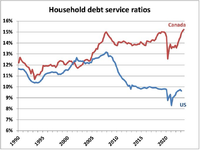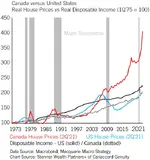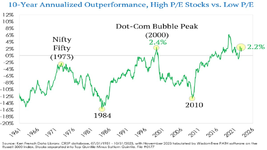The problem with the idea that property prices can spiral out of control isn't based in reality, because who is going to own those homes? When Prices to rents are 20, and then you take off all those extra little fees that landlords are responsible for like taxes, maintenance, insurance, vacancy, management, you might be left with earnings that are 2%. If you have to borrow any money at all, then you're hemorrhaging it. If you pay cash, then you have a very volatile investment (in can take a year+ to get rid of a non-paying tenant in parts of Canada or Europe), where, if everything works out perfectly as it should, you have 1/3rd the returns that you could get with a bank GIC, 1/5th what you'd bank in bank dividends, and you're subject to double the tax that you would compared to buying bank stock. You'd literally be lucky to make 1% free and clear. Secondly, appreciation is great when it happens, but there have been 2 decade stretches where after inflation RE has just kept up. RE as it stands today is a garbage investment based on the likelihood of appreciation, and the returns it garners. I'm not sure why any corporation, big or small would want to enter the game. Look at REITs, they've gotten slaughtered. Costs to buy are way up, rents are up, but no where near to the same degree. It's mostly just retard mom and pop investors who've drunk the koolaid the RE is a no lose investment that never goes down.
The reason why P/R could be high in Latin America is because on average, people don't make any money. Rents are a function of the markets they service. When I lived in Indo, You could rent a room for $30 a month. We rented a furnished 1000 sq ft, 2 br house in a touristy area for $325 a month - but then wages were literally 10% of the west. Ultimately all these things move lock and step. If a labourer makes $10 a day, then the laborer needs somewhere to live and raise a family for less then that. Meanwhile, the home he builds, will be subsequently cheaper, because the labour costs from everything to hewing lumber, to burning limestone for concrete, to putting it all together, will all subsequently be 1/20th the cost of what it would be in the west. Ultimately all costs are labour. The idea that a home should be about 3-4 years your salary, stems from the idea that it takes 3-4 man-years of labour to make a house. Whether you call the salary 100k and home 400k, or 10k and 40k, again all lock in step. At least in a sensible balanced economy. We're anything but in the west.
Ultimately though things can't get too far from the norm though, or else things don't work. Average people buying average homes *ARE* the market, and if that can't happen, then the whole market freezes up (Toronto sales rates are at 20+ year lows).
In another post, someone referenced the rising costs of owning, and i mentioned that it was worse here due to the differing start points of Canada vs the US since out "GFC" was 4 months with no foreclosures. I found another one that shows the total debt service of the two countries. A noticeable tick in the last couple years like the other one showed, but also the differing of the two start points for that uptick in both countries.






